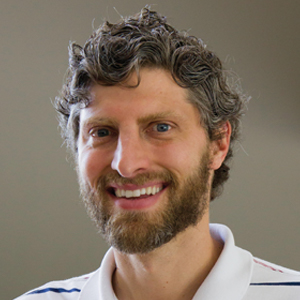A champion of the nerds
Since first singing those lyrics, Milo Aukerman has spent the past three decades doing everything not to live up to them. As both the lead singer of the seminal Los Angeles pop-punk band Descendents and a plant molecular biologist at DuPont, Aukerman has followed a decidedly nontraditional career path, one that allows him to embrace the most dynamic qualities of his two passions. Both a scientist and a musician, Aukerman blurs the lines between conventional definitions of these two professions.
 Aukerman
Aukerman
As a high-school student fascinated by the discovery of the structure of DNA and the recombinant DNA experiments of Stanley Cohen, Paul Berg and Herbert Boyer, Aukerman defied the science-geek stereotype by joining up with Tony Lombardo, Frank Navetta and Bill Stevenson in Descendents in 1980 to make a splash in the punk-rock scene. “My parents definitely had an expectation that I would be an academic-type person,” recalls Aukerman. However, “I needed a place to get my ya-ya’s out and actually be different.”
Growing up in Los Angeles, Aukerman had punk rock right on his doorstep. “In the late ’70s and early ’80s, LA punk rock was just blossoming,” he says, listing Black Flag, the Germs, X and the Minutemen as his musical inspirations back then. “It was a pretty amazing time just to be involved in that (scene) and play on the same shows as some of these bands.”
 One of the band's album covers. COURTESY OF FAT WRECK CHORDS
One of the band's album covers. COURTESY OF FAT WRECK CHORDS
Torn between his dual loves of music and science, Aukerman crafted the perfect compromise, now immortalized in the title of the band’s debut album, “Milo Goes to College,” which was released in 1982. Inspired by his actual departure from the band to study biochemistry at the University of California, San Diego, the album cover featured a caricature of Aukerman, complete with a white button-down shirt, black tie, thick-rimmed glasses and buzz cut, cementing the band’s iconic nerd image. As Aukerman, who earned his bachelor’s degree in biology in 1986, puts it, “Punk provided me that avenue to be different.”
For the next several years, Aukerman bounced between touring and recording with the band and working at UCSD to get his Ph.D. in biochemistry. The two lifestyles might seem to be conflicting, but Aukerman sees them as complementary. “Sometimes when the science is getting (to be) a little more of a drudge, that’s when I just turn to music and figure, well, now I’m going to take my creative energy and focus on music for a while,” he says. “Then maybe a couple of months later, the science takes the driver’s seat, and that ends up being where my creative energies go.”
Aukerman’s scientific career has challenged his own ideas about stereotypes within the research enterprise. After going along the traditional scientific academic path, including two postdoctoral fellowships, Aukerman had his heart set on a faculty position at an academic institution. By the time he followed his wife, Robin Andreason, to Delaware, where she was about to take up a faculty position at the university’s department of philosophy, “I was really on the academic track,” he says. But friends who were already working at DuPont suggested that he consider applying there.
 Milo Aukerman is part of the DuPont Crop Genetics group. COURTESY OF MILO AUKERMAN
Milo Aukerman is part of the DuPont Crop Genetics group. COURTESY OF MILO AUKERMAN
He accepted a job at DuPont as a principal investigator and admits thinking, “Oh, great. Here we go, into corporate research.” However, Aukerman discovered that the research environment at DuPont is very much like the one he was used to in academia “but in a corporate setting, without all the headaches of grant writing and teaching and all that kind of stuff."
"In fact, the first few years were an amazing time for me,” he says. During his time at DuPont, Aukerman and his colleagues have made several important discoveries, including uncovering that microRNAs are involved in controlling flowering time.
These days, as part of the DuPont Crop Genetics group, Aukerman is studying the model organism Arabidopsis thaliana to understand the genetic players for traits such as drought tolerance and nitrogen assimilation that will aid engineering hardier strains of maize. He has no ambition of climbing the corporate ladder. “I just want to have a really fascinating problem to work on,” he says. Immersed in research for now, Aukerman sees the band as “a hobby that allows me to maintain (a) youthful outlook on life and a freshness in life.”
Despite the unconventional shifting that he does between the worlds of molecular biology and punk rock, Aukerman says he’s never suffered “any kind of fallout.” Fellow scientists, he says, “are very interested in someone who’s not just stuck at the lab bench all day and who can actually go out and do something completely different, something wacky and bizarre.” Likewise, for peers in punk rock, “even if they don’t really understand what I do necessarily, it’s so different to them that it becomes more of a facet that can be fascinating,” he says. Even Aukerman’s parents have come around to supporting his career decisions. “Whenever I hang out with my mom, she’s trying to introduce me as ‘my rockstar son,’” he says with a laugh.
You might think that Aukerman is unique in his ability to rise above classifications and challenge the assumption that a scientist or a punk has to look or act a certain way. But he doesn’t think so. “There’s a stereotype of a punk being this tough, tattoo-laden meathead,” says Aukerman. “But in fact, many nerds ended up turning to punk, because it was a way of releasing some of that frustration that they had for being nerds.”
Having spent a lifetime avoiding being stereotyped or classified, Aukerman does defy the way labels are applied. As he proudly puts it, “Punks are the champions of the nerds.”
Updated 9/8/14: A previous version of this article incorrectly attributed the lyrics of "Suburban Home" to Aukerman. In fact, Tony Lombardo wrote the song. The article has been corrected, and we appreciate Reddit user VroomGoer's sharp eye.
Enjoy reading ASBMB Today?
Become a member to receive the print edition four times a year and the digital edition monthly.
Learn moreGet the latest from ASBMB Today
Enter your email address, and we’ll send you a weekly email with recent articles, interviews and more.
Latest in People
People highlights or most popular articles

2026 ASBMB election results
Meet the new Council members and Nominating Committee member.

Simcox wins SACNAS mentorship award
She was recognized for her sustained excellence in mentorship and was honored at SACNAS’ 2025 National Conference.

From humble beginnings to unlocking lysosomal secrets
Monther Abu–Remaileh will receive the ASBMB’s 2026 Walter A. Shaw Young Investigator Award in Lipid Research at the ASBMB Annual Meeting, March 7-10 in Washington, D.C.

Chemistry meets biology to thwart parasites
Margaret Phillips will receive the Alice and C. C. Wang Award in Molecular Parasitology at the ASBMB Annual Meeting, March 7-10 in Washington, D.C.

ASBMB announces 2026 JBC/Tabor awardees
The seven awardees are first authors of outstanding papers published in 2025 in the Journal of Biological Chemistry.

Decoding how bacteria flip host’s molecular switches
Kim Orth will receive the Earl and Thressa Stadtman Distinguished Scientists Award at the ASBMB Annual Meeting, March 7–10, just outside of Washington, D.C.


